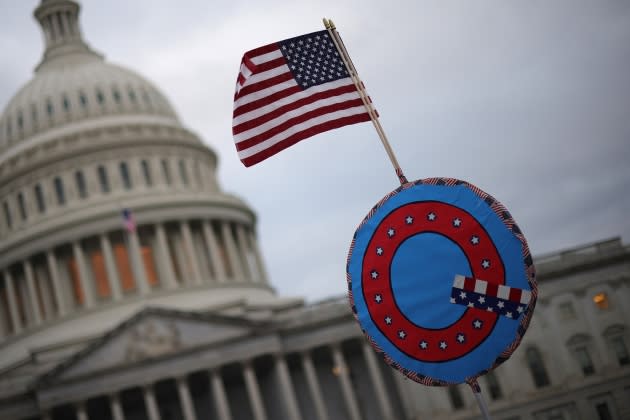Twitter Reinstates QAnon Kingpin Ron Watkins
- Oops!Something went wrong.Please try again later.
- Oops!Something went wrong.Please try again later.
- Oops!Something went wrong.Please try again later.

The Twitter account of QAnon conspiracy theorist Ron Watkins has been restored to the platform after being banned in 2020 as part of an effort to curb the reach of the conspiracy on the website. Watkins’ return is the latest in a series of account reinstatements for extremists under the administration of Twitter owner Elon Musk.
The son of Jim Watkins, owner and administrator of the extremist message board 8kun (previously known as 8chan), Watkins was an instrumental figure in the proliferation and growth of the QAnon conspiracy theory. Serving as an official administrator to 8Kun from 2016 until a 2020 resignation, Ron Watkins oversaw the message board at the time when the figure of “Q” exploded into the online ecosystem.
More from Rolling Stone
'Baked Alaska' Sentenced to 2 Months After Livestreaming Himself Rioting on Jan. 6
'Stop the Steal' Scoundrel Ali Alexander Reinstated to Twitter Day After Praising Brazilian Riot
Musk Fired Brazil Twitter's Election Misinfo Moderation Team: Report
Q, an anonymous figure claiming to hold high-level government classification, birthed a conspiracy theory on 4chan that the U.S. government was run by a deep state cabal of Satan-worshiping pedophiles that could only be defeated by Donald Trump. The covert poster quickly moved to 8kun, where “Q drops,” cryptic messages obsessively decoded by devotees, became the modus operandi.
The Watkins’ control of the website, linguistic analysis done by researchers, and statements made by Ron Watkins himself have led to speculation that he, at least for a period of time, was the figure behind Q.
On election day of 2020, Watkins publicly resigned from his position as an administrator on 8kun, dedicating himself instead to supporting efforts by Trump and his allies to overturn the election. Watkins promoted false claims about Dominion Voting Systems, appeared as an expert witness in a lawsuit filed by Trump lawyer Sidney Powell, and even had one of his appearances on One American News Network alleging fraud retweeted by Trump.
A draft investigative report from the Jan. 6 committee obtained by Rolling Stone detailed how Twitter and Facebook stumbled though efforts to prevent the violent insurrection that was being planned in their front yards. The report provided damming insight into Twitter administrators’ lack of awareness regarding far-right figures, including Watkins. In one instance, a Twitter executive replied “Who is Ron Watkins?” to an email from a Senate aid flagging content from Watkins’ account.
In the aftermath of the Capitol riot, social media platforms scrambled to get a retroactive grip on the flood of election misinformation and conspiracy mongering that had fueled the attempted insurrection. On Jan. 8, Twitter announced that it had banned prominent election conspiracy theories and QAnon figures, including General Michael Flynn, Powell, and Watkins.
Musk’s October takeover of the platform has been a gift to such figures. Under his supervision, the Tesla billionaire has granted amnesty to neo-Nazis, extremist figures, and conspiracy theorists who were previously banned from the website. Musk has also taken to issuing unilateral content moderation edicts aimed at silencing critics and curbing competition. Recent reinstatements include Neo-Nazi Andrew Anglin, and “Stop the Steal” founder Ali Alexander.
Alexander and Watkins were reinstated within days of a violent election riot in Brazil’s capital by the supporters of defeated former President Jair Bolsonaro that mirrored the American election riot people like Alexander and Watkins helped foment. The attack on federal buildings in Brasilia was largely organized via social media, with reports indicating that Musk fired most of Twitter’s Brazilian content moderation team in the months leading up to the violence.
The figures behind these anti-democratic efforts are now being rewarded rather than restrained. However, the offline consequences of sloppy content moderation policy, and of allowing the worst actors in politics to operate unchecked, are as borderless as the online spaces in which they organize.
Best of Rolling Stone
